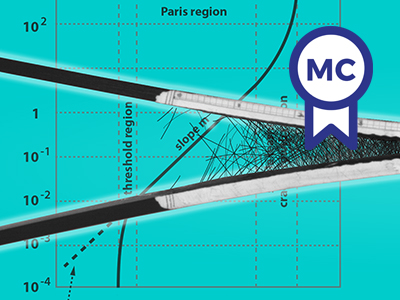Overview
Theoretical understanding of non-linear Finite Element Modeling and its application to practical engineering problems.
Computational methods in structural analysis are of prime importance in industry as tools to assess the performance of structures in the field of aerospace, mechanical, civil, and biomedical engineering. To design structures safely, engineers need to be able to predict their performance limits which often entails answering questions such as: when would damage appear? How much plastic deformation would there be? Where and how far would the crack grow? What are the structural responses after bucking? These questions go beyond the scope of linear elastic theories and linear modeling methods.
This course builds on the first course linear modeling and takes one step further. It delivers the skillsets in non-linear structural modeling & analysis using the non-linear Finite Element Method (FEM). The weekly lectures and practical sessions impart both theoretical knowledge on non-linear FEM and practical experience with the modeling pipeline of commercial FE software. There will be optional online hangout sessions for the discussion of theories, exercises, assignments, etc. Professionals in many engineering sectors working on material & structural simulations will benefit from adding non-linear FEM to their skills array. By the end of this course, you will be able to:
- understand and explain the theories of non-linear FEM, and use them to perform analytical work;
- apply non-linear FEM to solve practical non-linear structural problems
- identify and employ efficient modelling techniques
Practicals and assignments are done using Abaqus (for which you will obtain a student license for the duration of the course). Note that TU Delft can offer you only a student license of Abaqus, which is sufficient to complete the course. (More information about the software in the "Details" tab.)
The previous course, Linear Modeling, is highly recommended before taking this course. Working professionals who are already experienced with structural/stress analysis may choose to enroll directly in the Non-linear Modeling course.
Earn a Microcredential with this course
A Microcredential is an additional quality certification for small educational units. It shows what knowledge, competence and experience the participant has gained upon successful completion of the course. A Microcredential is awarded in the form of a digital badge which can be shared and is instantly verifiable.
This certification is awarded to participants who enroll and complete the course starting on February 12, 2024 or later.
More information
Details
Non-Linear modeling is an advanced course as a follow up to linear modeling. It is based on the extension of the Finite Element (FE) method to the non-linear domain. Applications include geometric, material and contact nonlinearities. The course uses a free FE package (for students) in weekly practical sessions, where you will model sample problems to gain hands-on experience. Students are expected to be well versed with FE software usage if they have not followed the linear modeling course. Please note that this is not a software training course. The software is treated as an application platform to try out the nonlinear FE theories.
Assessment
Multiple assignments are provided, with both theoretical and practical questions. The assessment of this course will be based on the assignment reports.
Syllabus
Week 0: Self-study/Revision. Recap of linear finite element method formulation and usage.
Week 1: An introduction to the types of nonlinearities; general form of a nonlinear finite element equation; demonstrate some common nonlinear solution methods; convergence criteria and common convergence issues.
Practical: Familiarize with the non-linear analysis module of ABAQUS; create a simple model with 1D and 2D elements; carry out a non-linear analysis using two Newton methods.
Week 2: The limitations of Newton type methods; arc-length method; start the theory of geometrical nonlinear FEM (fundamental concepts of continuum mechanics).
Practical: carry out a non-linear analysis using Newton and Arc-length method
Week 3:Finish geometrical nonlinear FEM: finite element discretization of the weak form and derive the expressions of internal & external force vectors and tangent stiffness matrix; examples for truss, beam, and plate elements; buckling & post-buckling analysis.
Practical: Buckling & post-buckling analysis
Week 4: Contact modeling: finite element weak form; penalty and Lagrange multiplier methods; some practical issues; exercise on a contact problem.
Practical: Try out different contact algorithms on a problem with analytical stress solution
Week 5: Plasticity: yield condition, flow rule, hardening, loading/unloading conditions, Prager's consistency condition, tangent modulus, return mapping algorithm.
Practical: Model plastic deformation in metal
Week 6: Fracture and damage: energy concepts of fracture mechanics (Griffith & Irwin) and the cohesive zone theory; the formulations of cohesive element and smeared crack/continuum damage model; viscous regularization.
Practical: Model a debonding problem using cohesive zone approaches
Week 7: some advanced methods for modeling crack propagations, we will discuss remeshing, nonlocal damage model, XFEM, Phantom Node Method and Floating Node Method.
Practical: Model a crack propagation problem with XFEM
Software license
Practicals and assignments are done using Abaqus (for which you will obtain a student license for the duration of the course).
Can I use a different software?
The course focuses primarily on the theory behind FEM and the essential steps that need to be taken. Many students who have entered the industry reported that they had no difficulty applying the theory they learned to different software. They found the course valuable because it teaches them to develop a critical eye, and the workflow is similar across various software. While we cannot provide a license or support for a different software, you are still free to use a software of your choice. All programs should generally operate in a similar way, and the theory explained in this course is consistent across all software, so the course will still be beneficial regardless of the program you choose to use. Please be aware that if a different software is used, it will be the student's responsibility to find the correct implementation of the problem. Unfortunately, we won't be able to provide support in this situation.
Qualifications
Certification
If you successfully complete your online course you will be awarded with a TU Delft certificate.
This certificate will state that you were registered as a non-degree-seeking student at TU Delft and successfully completed the course. The certificate will also indicate the number of ECTS credits this course is equal to (3 ECTS) when this course is taken as part of a degree program at the university.
This course is a MSc course in the Faculty of Aerospace Engineering. If you decide that you would like to apply to the full Master's program in Aerospace Engineering, you will need to go through the admission process as a regular MSc student. If you are admitted, you can then request an exemption for this course that you completed as a non-degree-seeking student. The Board of Examiners will evaluate your request and will decide whether or not you are exempted.
Chartered Engineering Competences
All our online courses and programs have been matched to the competences determined by KIVI’s Competence Structure, a common frame of reference for everyone, across all disciplines, levels and roles.
These competences apply to this course:
- A1: Extend your theoretical knowledge of new and advancing technologies.
Admission
Below, you can find the expected prior knowledge required to participate in this course. Please note that these are provided as indications only. TU Delft will not request proof of this prior knowledge through copies of degrees or diplomas. However, it is your responsibility to ensure that you possess the necessary knowledge, acquired through prior education or relevant work experience.
- A relevant BEng or BSc degree in a subject closely related to the content of the course or specialized program in question, such as aerospace engineering, aeronautical engineering, mechanical engineering, civil engineering or (applied) physics.
- The learning objectives of the following TU Delft courses:
- Basic Structural Mechanics
- Structural Analysis & Buckling
- Vibrations
- Differential Equations and Linear Algebra
- Linear Modeling including relevant linear FEM experience
- Level of English equivalent to one of the following certificates:
- TOEFL score 90+ (this is an internet-based test)
- IELTS (academic version) overall Band score of at least 6.5
- University of Cambridge: "Certificate of Proficiency in English" or "Certificate in Advanced English"
Admission process
In order to complete your admission process you will be asked to upload a valid copy of your passport or ID card.
Contact
If you have any questions about this course or the TU Delft online learning environment, please visit our Help & Support page.


